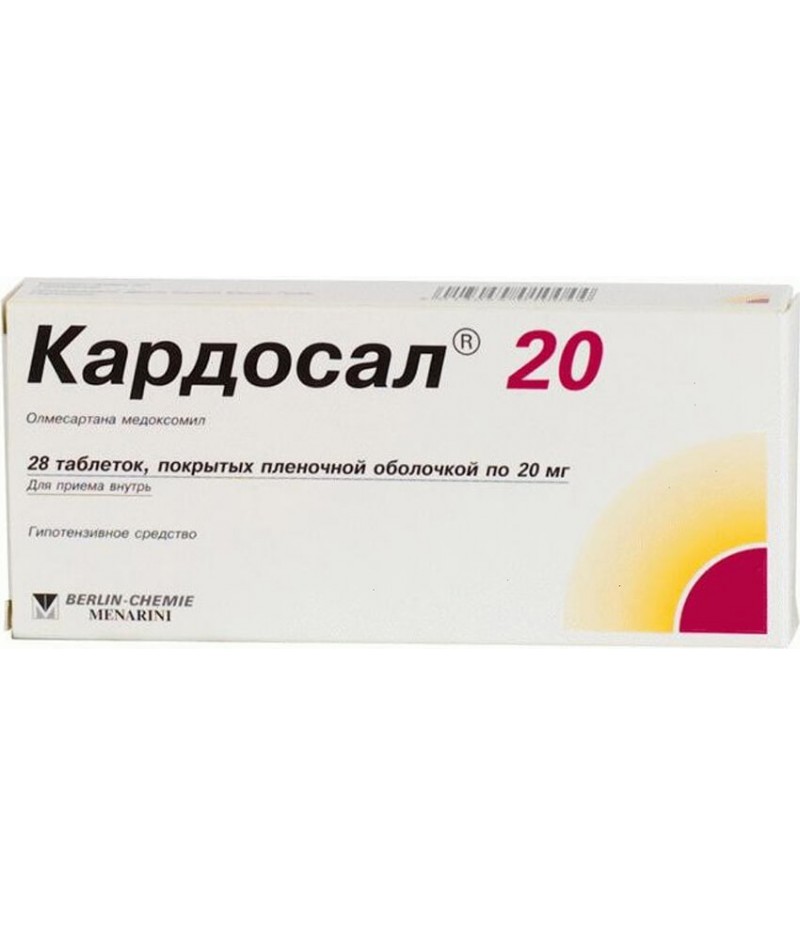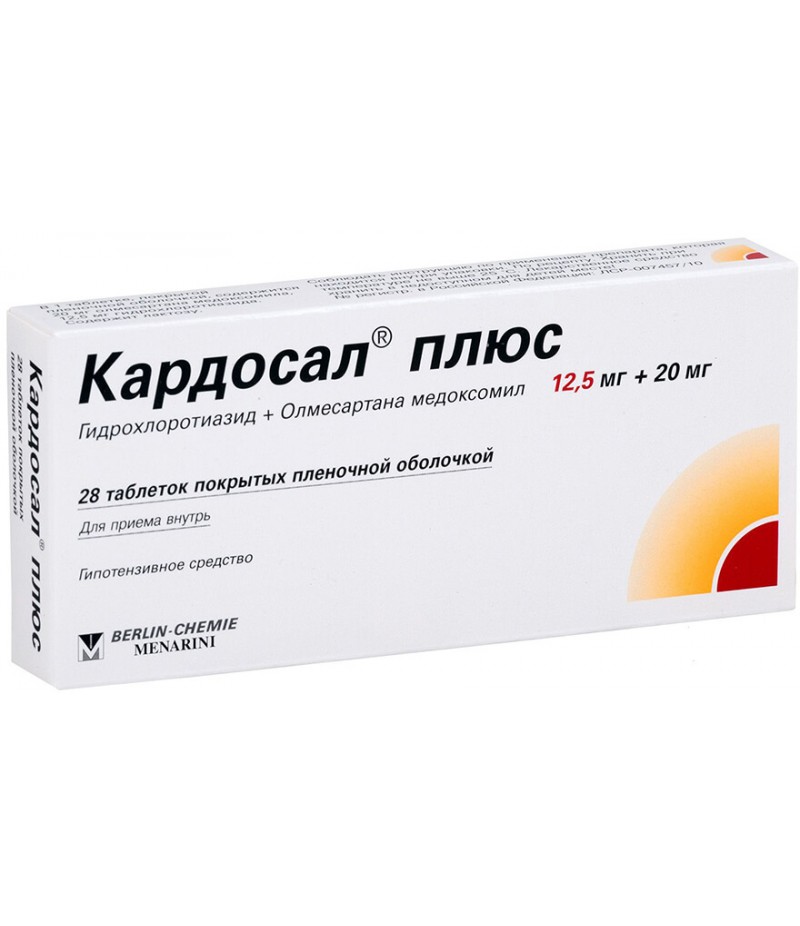Cardosal tabs 20mg #28
- $34.55
- 3 or more $33.99
- Availability:In Stock
User manual for CardosalYou can buy Cardosal without prescriptionTo buy other dosage just contact us!CompositionOne tablet of Cardosal 40 includes 40 mg of medosomil olmesartan.One tablet of Cardosal 20 includes 20 mg of medosomil..
Tags: tabs
User manual for Cardosal
You can buy Cardosal without prescription
To buy other dosage just contact us!
Composition
One tablet of Cardosal 40 includes 40 mg of medosomil olmesartan.
One tablet of Cardosal 20 includes 20 mg of medosomil olmesartan.
One tablet of Cardosal 10 contains 10 mg of medosomil olmesartan.
Additional substances: giprolose, microcrystalline cellulose, lactose monohydrate, magnesium stearate.
Sheath composition: hypromellose, talc, titanium dioxide.
Form of issue
14 tablets in a pack of cells - one, two, four or seven packs in a cardboard box.
pharmachologic effect
Hypotensive effect.
Pharmacodynamics and pharmacokinetics
Pharmacodynamics
The blocker of angiotensin receptors of the second type, which is a hormone and plays an important role in the development of arterial hypertension.
Olmesartan presumably inhibits the effects of angiotensin type II by blocking the corresponding receptors.
With arterial hypertension causes a dose-dependent long-term pressure decrease. There is no data on the occurrence of arterial hypotension, tachycardia (during prolonged treatment) or withdrawal syndrome after taking the drug.
Taking olmesartan once a day provides a gentle and effective decrease in pressure during the day. The hypotensive effect develops in two weeks, and the greatest effect is approximately two months after the start of treatment.
Pharmacokinetics
The active substance is a prodrug. In the mucosa of the digestive tract, under the action of enzymes, it quickly turns into an active metabolite. Medoxomil olmesartan in its original form in the blood is not fixed. Bioavailability is approximately 25.6%. The highest concentration in the blood is achieved on average two hours after oral administration. Eating does not affect bioavailability.
It binds to plasma proteins by 99.7%. The connection with the blood cells is weak. 40% of the drug is excreted by the kidneys, another 60% - with bile. The half-life is 11-14 hours.
Indications for use
Arterial hypertension is of an essential nature.
Contraindications
Renal failure, a condition after a kidney transplant.
Obstruction of the biliary tract.
Lack of lactase, malabsorption syndrome or galactosemia.
Age is less than 18 years.
Pregnancy and lactation.
Hypersensitivity to the components of the drug.
It is recommended to use with caution the drug with the following diseases and conditions:
obstructive hypertrophic cardiomyopathy;
stenosis of the heart valves;
primary aldosteronism;
renal failure of mild degree;
hyperkalemia or hyponatremia;
chronic heart failure;
cardiac ischemia;
bilateral stenosis of the arteries of the kidneys;
cerebrovascular disorders;
decrease in the volume of circulating fluid due to diet, vomiting or diarrhea;
impaired liver function;
elderly age;
combined use with diuretics.
Side effects
Before you buy Cardosal you should know these side effects of the drug:
Reactions from hematopoiesis: thrombocytopenia.
Reactions from the nervous activity: dizziness, headache.
Reactions from the side of breathing: cough, rhinitis, pharyngitis, bronchitis.
Reactions from digestion: nausea, diarrhea, indigestion, abdominal pain, gastroenteritis, vomiting.
Skin reactions: itching, rash on the skin, allergic dermatitis, Quincke's edema, hives.
Reactions from the musculoskeletal system: pain in the bones and joints, arthritis, back pain, muscle spasms.
Reactions from the genitourinary tract: urinary tract infections, hematuria, acute renal failure.
Reactions from laboratory tests: an increase in urea and creatinine in the blood, an increase in the content of liver enzymes.
Reactions from the circulation: tachycardia, stenocardia, lowering of pressure.
Reactions from the metabolism: increase in the content of creatine phosphokinase, hyperuricemia, hypertriglyceridemia, hyperkalemia.
Common reactions: flu-like symptoms, chest pain, asthenia, peripheral edema, malaise, fatigue, drowsiness.
Instructions for use Cardosal (Method and dosage)
Instructions for use Cardosal prescribes to take the drug orally every day at the same time, once a day.
The recommended primary dose is 10 mg once a day. If the pressure reduction is insufficient when taking 10 mg per day, it is possible to increase it to 20 mg per day. In case an additional pressure reduction is required, the dosage is increased to a maximum of 40 mg per day or additionally prescribed a diuretic (eg, hydrochlorothiazide).
The greatest daily dose is 40 mg.
Overdose
Signs of an overdose: a strong decrease in pressure.
Therapy: it is recommended to put the patient on his back, giving his feet an elevated position. It is recommended to perform gastric lavage, prescribe activated charcoal, if necessary adjust the changes in water-salt metabolism, timely replenish the volume of circulating fluid.
Interaction
It is not advised to share with potassium preparations, potassium-sparing diuretics or other agents that can increase the potassium content in the blood.
The antihypertensive effect of treatment with olmesartan is enhanced when combined with other antihypertensive drugs.
Non-steroidal anti-inflammatory drugs, second-type cyclooxygenase inhibitors and angiotensin II receptor blockers of the second type can interact synergistically, suppressing glomerular filtration. In this case, there is a possibility of acute renal failure. To avoid such phenomena, it is recommended to monitor the kidneys at the beginning of therapy, as well as the timely reception of a sufficient volume of fluid.
When combined with antacids, a moderate decrease in the bioavailability of olmesartan is possible.
The use of olmesartan together with lithium preparations is dangerous by increasing the concentration of the latter in the blood.
Storage conditions
Store at temperatures up to 30 degrees. Keep away from children.
Shelf life - 3 years.
special instructions
When using the drug in people with impaired renal function, it is recommended to regularly monitor the content of potassium and creatinine in the blood.
It should be remembered that excessive pressure reduction in patients with ischemic disease or with cerebrovascular changes can cause a heart attack or stroke.
When driving vehicles during the period of treatment, this drug should be cautious.
Children
The drug is not intended for the treatment of children.
In pregnancy and lactation
The appointment of the drug in these periods is contraindicated.
Reviews about Cardosal
Reviews of Cardosal on the forums and the doctors' reviews of the drug repeat each other and report an excellent hypotensive effect and frequent side effects in the form of permanent weakness and pain in the chest. If such symptoms appear, consult a doctor.


